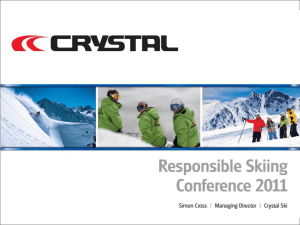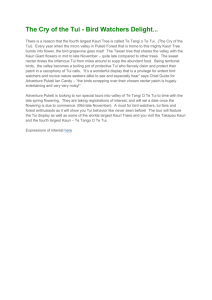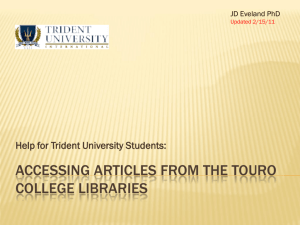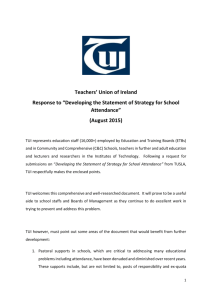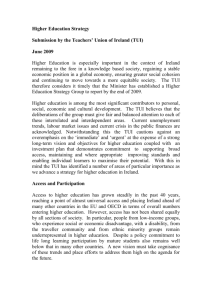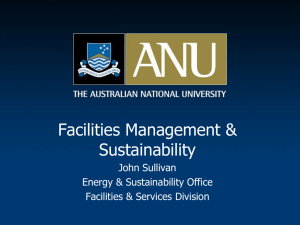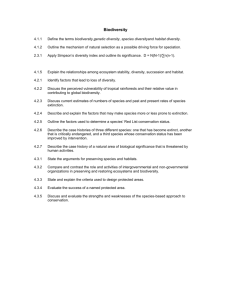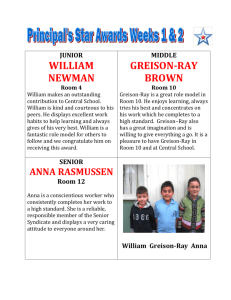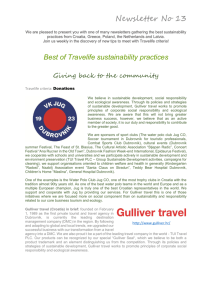Biodiversity management at TUI
advertisement
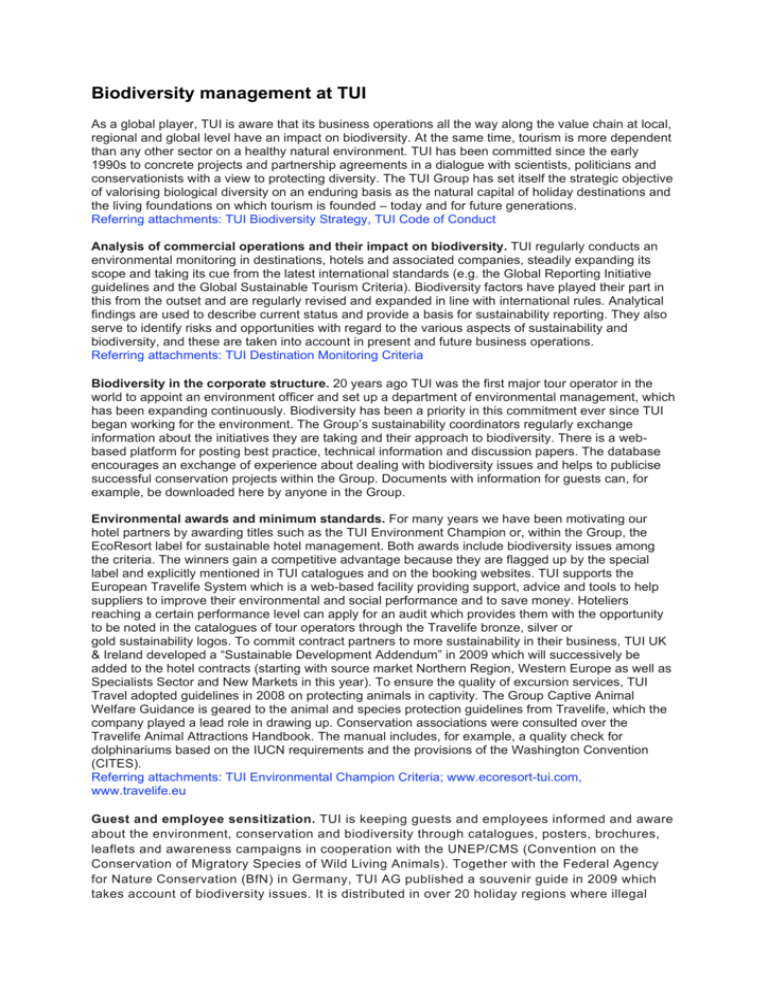
Biodiversity management at TUI As a global player, TUI is aware that its business operations all the way along the value chain at local, regional and global level have an impact on biodiversity. At the same time, tourism is more dependent than any other sector on a healthy natural environment. TUI has been committed since the early 1990s to concrete projects and partnership agreements in a dialogue with scientists, politicians and conservationists with a view to protecting diversity. The TUI Group has set itself the strategic objective of valorising biological diversity on an enduring basis as the natural capital of holiday destinations and the living foundations on which tourism is founded – today and for future generations. Referring attachments: TUI Biodiversity Strategy, TUI Code of Conduct Analysis of commercial operations and their impact on biodiversity. TUI regularly conducts an environmental monitoring in destinations, hotels and associated companies, steadily expanding its scope and taking its cue from the latest international standards (e.g. the Global Reporting Initiative guidelines and the Global Sustainable Tourism Criteria). Biodiversity factors have played their part in this from the outset and are regularly revised and expanded in line with international rules. Analytical findings are used to describe current status and provide a basis for sustainability reporting. They also serve to identify risks and opportunities with regard to the various aspects of sustainability and biodiversity, and these are taken into account in present and future business operations. Referring attachments: TUI Destination Monitoring Criteria Biodiversity in the corporate structure. 20 years ago TUI was the first major tour operator in the world to appoint an environment officer and set up a department of environmental management, which has been expanding continuously. Biodiversity has been a priority in this commitment ever since TUI began working for the environment. The Group’s sustainability coordinators regularly exchange information about the initiatives they are taking and their approach to biodiversity. There is a webbased platform for posting best practice, technical information and discussion papers. The database encourages an exchange of experience about dealing with biodiversity issues and helps to publicise successful conservation projects within the Group. Documents with information for guests can, for example, be downloaded here by anyone in the Group. Environmental awards and minimum standards. For many years we have been motivating our hotel partners by awarding titles such as the TUI Environment Champion or, within the Group, the EcoResort label for sustainable hotel management. Both awards include biodiversity issues among the criteria. The winners gain a competitive advantage because they are flagged up by the special label and explicitly mentioned in TUI catalogues and on the booking websites. TUI supports the European Travelife System which is a web-based facility providing support, advice and tools to help suppliers to improve their environmental and social performance and to save money. Hoteliers reaching a certain performance level can apply for an audit which provides them with the opportunity to be noted in the catalogues of tour operators through the Travelife bronze, silver or gold sustainability logos. To commit contract partners to more sustainability in their business, TUI UK & Ireland developed a “Sustainable Development Addendum” in 2009 which will successively be added to the hotel contracts (starting with source market Northern Region, Western Europe as well as Specialists Sector and New Markets in this year). To ensure the quality of excursion services, TUI Travel adopted guidelines in 2008 on protecting animals in captivity. The Group Captive Animal Welfare Guidance is geared to the animal and species protection guidelines from Travelife, which the company played a lead role in drawing up. Conservation associations were consulted over the Travelife Animal Attractions Handbook. The manual includes, for example, a quality check for dolphinariums based on the IUCN requirements and the provisions of the Washington Convention (CITES). Referring attachments: TUI Environmental Champion Criteria; www.ecoresort-tui.com, www.travelife.eu Guest and employee sensitization. TUI is keeping guests and employees informed and aware about the environment, conservation and biodiversity through catalogues, posters, brochures, leaflets and awareness campaigns in cooperation with the UNEP/CMS (Convention on the Conservation of Migratory Species of Wild Living Animals). Together with the Federal Agency for Nature Conservation (BfN) in Germany, TUI AG published a souvenir guide in 2009 which takes account of biodiversity issues. It is distributed in over 20 holiday regions where illegal trading in souvenirs often involves endangered species. Since November 2009, the TUIfly fleet has also included biodiversity ads produced by the BfN in the in-flight viewing schedule. Referring attachments: TUI souvenir guide (German language, English translation in preparation) Sustainable product development. Targeting our product development towards sustainability and future viability is a key part of our work. Together with the nature conservation organisations ‘Sociedad Española de Cetáceos’ (Tenerife) and ‘M.E.E.R. e.V.’ (La Gomera and Tenerife), TUI developed sustainable whale watching excursions on the Canary Islands. To avoid negative impacts on the cetaceans these excursions are strictly conducted according to the principles of sustainability and species protection and raise the awareness of holidaymakers by providing trained guides and information material on the subject. Other responsible excursions take place in Kenya and on the Azores. As a further sustainable product TUI offers volunteering with i-to-i Travel. Here customers can combine travel experience with voluntary environmental or social commitment. Locals in more than 20 destinations organise environmental and community projects that our customers can support on site by providing their manpower (e.g. for wildlife conservation projects in Africa). In cooperation with the Global Nature Fund (GNF) TUI offers an environmental excursion in Sri Lanka. The excursion takes participants to the Madampa Lake in the Ambalangoda region. In the training centre, visitors are given an introduction to the biodiversity in the lake and to diverse environmental and auxiliary programmes carried out by the local population. Referring attachments: TUI Guidelines for sustainable whale watching, TUI Environmental excursion in Sri Lanka - description
